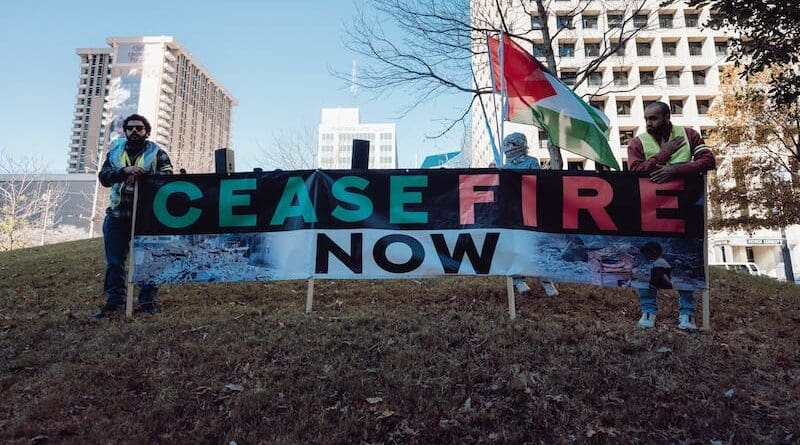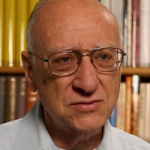
From River To Sea Both Should Be Freed From Hatred And Suffering – OpEd
In Arabic, the word Jihad is a noun meaning the activity of “striving and/or persevering.” According to Prophet Muhammad there are two types of Jihad: minor and major. Once when Muslims were returning from a military expedition, which for Prophet Muhammad was a minor jihad. He said to the fighters that now they had to go through the major jihad. When Prophet Muhammad was asked what he meant by major jihad, he said it was the spiritual jihad.
On another occasion, he said the real mujahid is the one who declares jihad against his/her carnal soul. (Tirmidhi). Exercising self-control and using willpower and reason to overcome one’s anger is described by Prophet Muhammad as “the major jihad.” Overcoming our own feelings of hatred, revenge and anger is much more difficult than overcoming our enemies.
In today’s world of fanaticism and extremism the words of Al-Ghazali, a 12th century Persian Muslim theologian, need to be repeated by all the world’s religious and political leaders: “Declare your jihad on thirteen enemies you cannot see – Egoism, Arrogance, Conceit, Selfishness, Greed, Lust, Intolerance, Anger, Lying, Cheating, Gossiping and Slandering. If you can master and destroy them, then you will be ready to fight the enemy you can see.”
Congresswoman Rashida Tlaib says, “From the river to the sea is an aspirational call for freedom, human rights, and peaceful coexistence, not death, destruction, or hate.” I say we can make it truly aspirational by making it focus on both people first and the land second. “From the river to the sea Palestinians and Israelis should be freed of hatred and suffering by ‘a two state for two peoples sharing of the land peacefully.'”
But the Hamas’ 2017 charter states that in principle, it “rejects any alternative to the full and complete liberation of Palestine, from the river to the sea.” Hamas opposes a two state solution, wants all the land between the Mediterranean Sea and the River Jordan, and violently opposed the Oslo peace accords negotiated by Israel and the Palestine Liberation Organization (PLO) in the mid-1990s. If the war ends with Hamas eliminated, and with a new Israeli government elected; there is the hope that the miracle of the Yom Kippur War may be repeated.
On October 27, 1978, only five years after Egypt started the Yom Kippur War with a surprise attack on Israel, Egyptian President Anwar Sadat and Israeli Prime Minister Menachem Begin were named winners of the Nobel Peace Prize for their progress toward achieving a Middle East accord. The Yom Kippur War was followed six years later by a Peace Treaty between Egypt and Israel.
Could the same process follow the defeat of Hamas, and its opposition to a two state solution? The only possible chance for avoiding more wars is the two state solution. To establish a Palestinian state alongside Israel. That will not be possible with the current leaders on either side. Extremists, both Israeli and Palestinian, will do all they can to sink the idea, as they have done since the 1990s. If this war does not deliver enough of a shock to break deeply-held prejudices and to make the idea of two states viable, nothing will. And without a mutually-acceptable way of ending the conflict, more generations of Palestinians and Israelis will be sentenced to more wars.
Although it might seem impossible now, I do believe that within a decade or two Muslims will visit Jerusalem and pray together with Jews as Prophet Isaiah states: “In that day there will be a highway from Egypt to Assyria. The Assyrians will go to Egypt, and the Egyptians to Assyria. The Egyptians and Assyrians will worship together. On that day Israel will join a three-party alliance with Egypt and Assyria, a blessing upon the heart. The LORD of Hosts will bless them saying, “Blessed be Egypt My people, Assyria My handiwork, and Israel My inheritance.” …(Isaiah 19:23-5) And then “Nation shall not lift sword against nation, neither shall they learn war anymore. (Isaiah 2:4)
For more than seven decades political nationalist leaders in Israel and Palestine have failed to find a way to end the conflict between their two peoples. Perhaps it is time for religious leaders who understand the religious importance of repentance, humility, forgiveness, compromise and hope for peace in overcoming more than seven decades of pain and anger. As the Qur’an states: “Perhaps Allah will put, between you and those to whom you have been enemies among them, affection. And Allah is competent, and Allah is Forgiving and Merciful.” (60:7) Then the words of the Qur’an will be full-filled “From the depths of Darkness into the Light; for Allah is very kind and merciful to you.” (Qur’an 57:9)
There is much about the Gaza war that we still don’t know: how long it will last, what the death toll will be, how many hostages can be rescued or returned, and how successful Israel will be in its declared objective of destroying Hamas.
But so far the most important fact is that Iran isn’t getting what it wanted from the war. The real goal was to disrupt the gradual deepening of the strategic ties between Israel and its most important Arab neighbors. Tehran’s support for Bashar al-Assad in Syria is responsible for many times more deaths and refugees than all the Israeli-Palestinian wars combined. Indeed, Iran’s supreme leader Ayatollah Ali Khamenei told Hamas leader Ismail Haniyeh that Iran would not enter Hamas’ war with Israel; and accused the terror group of not giving Iran any prior warning of the October 7 attacks.
Dr. Mohamed Chtatou, a Professor at a university in Rabat, Morocco writes: “After the current (Hamas-Israel) war, Israel’s ultra-nationalist coalition will undoubtedly be undermined by public opinion, and probably by a commission of inquiry. If the Palestinian Authority were to agree to take over Gaza – backed by the international reconstruction aid that would inevitably arrive – and if a centrist coalition government were to emerge in Israel, everything would once again be possible. Two difficult “ifs”? Perhaps, but there is no serious alternative.”
The Qur’an refers to Prophet Abraham as a community or a nation: “Abraham was a nation/community [Ummah]; dutiful to God, a monotheist [hanif], not one of the polytheists.” (16:120) If Prophet Abraham is an Ummah; then fighting between the descendants of Prophets Ishmael and Isaac is a civil war and should always be avoided. And prior to the 20th century Arabs and Jews never did make war with each other. Even the surprise attack by Egypt and Syria of the Yom Kippur War was followed six years later by a Peace Treaty between Egypt and Israel. Could the same process follow the defeat of Hamas?
If all Arabs and Jews can live up to the ideal that ‘the descendants of Abraham’s sons should never make war against each other’ is the will of God; we will help fulfill the 2700 year old vision of Prophet Isaiah: “In that day there will be a highway from Egypt to Assyria. The Assyrians will go to Egypt, and the Egyptians to Assyria. The Egyptians and Assyrians will worship together. In that day Israel will join a three-party alliance with Egypt and Assyria, a blessing upon the heart. The LORD of Hosts will bless them saying, “Blessed be Egypt My people, Assyria My handiwork, and Israel My inheritance.”…(Isaiah 19:23-5)
Prophet Muhammad said: “Should I not tell you what is better in degree than prayer, fasting, and charity.” They (the companions) said: “Yes.” He said: “Reconciling people, because grudges and disputes are a razor (that shaves off faith).” (Ahmad, Abu Dawood, and At-Tirmithi)
This is an excellent guide to dealing with the three-generation old Israeli-Palestinian conflict. Rather than focusing mostly on what the other side did to us, we all should focus on how the conflict has hurt all of us, and how much better our future would be if we could live next to each other in peace. If the descendants of Prophet Isaac and Prophet Ishmael negotiate a settlement that reflects the religious policy that “…there is no sin upon them if they make terms of settlement between them – and settlement [reconciliation and peace] is best.” (Quran 4: 128)
Three thousand Hamas gunmen invaded southern Israel on October 7 2023, killing 1,200 people and taking another 253 back to Gaza as hostages. As of February 19, 2024, 30,000 Palestinians, including about 12,000 Hamas fighters killed in Gaza since Israel launched a major military campaign in response.
If Hezbollah attacks Israel there will be two to three times more deaths. A Hamas official based in Qatar told Reuters that the terror group estimated it had lost 6,000 fighters during the four-month-old conflict, well below the 12,000 Israel says it has killed. The comments were a rare acknowledgment from the Hamas terror group that it has suffered significant losses and appeared to mark the first time that Hamas has differentiated between combatants and civilians in a death toll from the war.
Iran has warned its proxy Hezbollah not to give Israel cause to launch a full-scale war along the Israel-Lebanon border, fearing it would risk gains it believes Iran has made in the region since Hamas’s October 7 massacres in southern Israel.
The Nakba (catastrophe), the displacement of Palestinians during the 1948 establishment of the State of Israel and the War of Independence, could have been avoided if the Palestinian leadership had accepted the UN two state solution. Indeed, if the Palestinian leadership had accepted the British 1937 two state solution; millions of Jews would have been able to escape the Holocaust (catastrophe). Hopefully, the Palestinians will not make an all or nothing mistake again.
A mid February national poll by Channel 12 news indicated that the current opposition, along with Benny Gantz’s National Unity party (previously in the opposition but now a member of the emergency government), could secure 75 of the Knesset’s 120 seats if elections were held today, with the bloc loyal to Prime Minister Netanyahu far behind at 45. Israel will be ready for a two state solution if the Palestinians desire an honest peace, meaning a total Peace to end the 83 years of conflict.

Rabbi Allen S. Maller
Allen Maller retired in 2006 after 39 years as Rabbi of Temple Akiba in Culver City, Calif. He is the author of an introduction to Jewish mysticism. God. Sex and Kabbalah and editor of the Tikun series of High Holy Day prayerbooks.
No comments:
Post a Comment